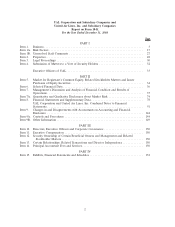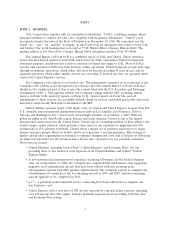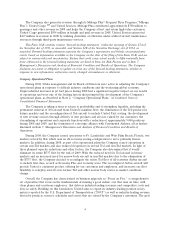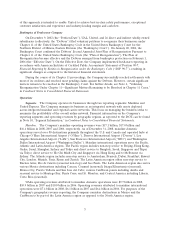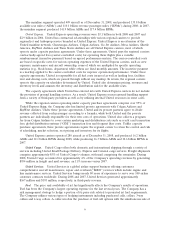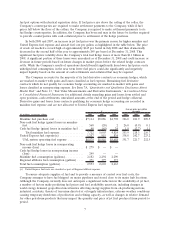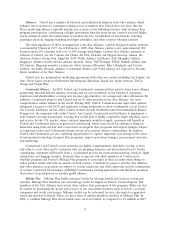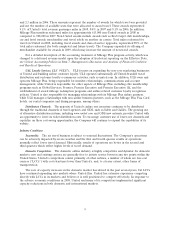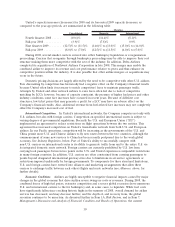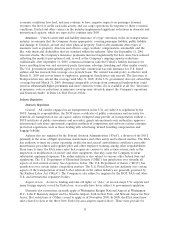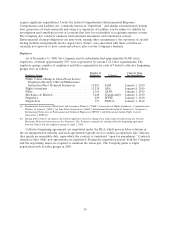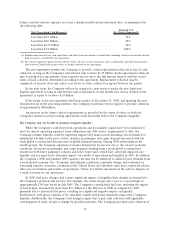United Airlines 2008 Annual Report Download - page 12
Download and view the complete annual report
Please find page 12 of the 2008 United Airlines annual report below. You can navigate through the pages in the report by either clicking on the pages listed below, or by using the keyword search tool below to find specific information within the annual report.government confiscation of a portion of slots at each airport from incumbent airlines and establish a
process whereby those slots will be auctioned over the course of five years. The confiscation and auction
provisions are controversial and are currently the subject of litigation in federal appellate court, in which
carriers serving those airports and the Port Authority of New York and New Jersey claim that the FAA
lacks legal authority to conduct slot auctions. On December 8, 2008, the federal appellate court in
Washington D.C. stayed the auction pending a decision on the challenges to the auction process. It is
difficult to predict the outcome of that litigation. If the slot auction provisions remain in effect, United
will likely lose a small number of slots at each of the three New York City-area airports, however the
exact number is not yet known. It is not yet clear what impact this might have on United’s operations at
those airports.
Also in 2008, the DOT finalized amendments to its rates and charges policy that grant new
authority to U.S. airports to implement forms of congestion pricing. The Air Transport Association has
filed a legal challenge to the amended policy. We are currently unaware of any action by an airport to
change pricing based on the new authority. It is difficult to predict whether any given airport might seek
to implement this new authority and what impact on revenues or costs a change in airport charges
arising from this policy might have on United.
At the end of 2008, the DOT proposed new regulations intended to enhance air passenger
protection. If made final as proposed, the new regulations would create new areas of regulation and
potentially permit passengers to sue air carriers should the carriers fail to meet certain service
performance criteria.
Legislation. The airline industry is also subject to legislative activity that can have an impact on
operations and costs. Specifically, the law that authorizes federal excise taxes and fees assessed on airline
tickets expired in September 2007 was extended to February 28, 2008, and extended again until March 31,
2009. Congress is currently attempting to pass comprehensive reauthorization legislation to impose a
new funding structure and make other changes to FAA operations. Past aviation reauthorization bills
have affected a wide range of areas of interest to the industry, including air traffic control operations,
capacity control issues, airline competition issues, aircraft and airport technology requirements, safety
issues, taxes, fees and other funding sources. There also exists the possibility that Congress may pass
other legislation that could increase labor and operating costs. Legislation is expected to focus on
outsourced maintenance, Family and Medical Leave Act changes and other work rules. Climate change
legislation, which would regulate green-house gas emissions, is also likely to be a significant area of
legislative and regulatory focus and could adversely impact fuel costs. Customer service issues have
remained active areas for both Congress and DOT regulators during 2008. In addition to DOT-proposed
customer service regulations discussed above, legislation imposing more specific customer service
requirements is likely to be approved by Congress in 2009, though what those requirements might be is
unclear at this time. The DOT has also proceeded with regulatory changes in this area, including
proposals regarding treatment of and payments to passengers involuntarily denied boarding, domestic
baggage liability, proposals regarding flight delay reporting requirements and airline scheduling practices.
Additionally, since September 11, 2001, aviation security has been and continues to be a subject of
frequent legislative and regulatory action, requiring changes to the Company’s security processes and
frequently increasing the cost of its security procedures.
International Regulation.
General. International air transportation is subject to extensive government regulation. In
connection with United’s international services, the Company is regulated by both the U.S. government
and the governments of the foreign countries United serves. In addition, the availability of international
routes to U.S. carriers is regulated by aviation agreements between the U.S. and foreign governments,
and in some cases, fares and schedules require the approval of the DOT and/or the relevant foreign
governments.
12


